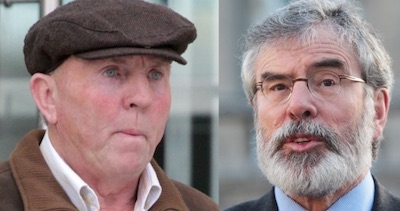
Sinn Fein president Gerry Adams has said the use of non-jury trial in the case of a prominent republican accused of tax evasion is “just plain wrong”.
Last week, north Louth farmer Tom Murphy (pictured, left) was convicted of allegations that he failed to make tax returns over a period from 1996 to 2004. He was convicted by the Special Criminal Court, a juryless court set up in 1972 to streamline the imprisonment of Irish republican ‘subversives’.
Allegations that Mr Murphy once played a leading role in the Provisional IRA motivated the hostile treatment by both the 26 County judicial system and the mainstream media.
When he criticised the non-jury legal system used to convict Mr Murphy, Gerry Adams and his party were repeatedly denounced by elements of the political and media establishment.
“It really has not an awful lot to do with Tom Murphy,” Mr Adams said, at the height of the furore. “If Tom Murphy, as I have said publicly, is guilty of any offences then he will have to pay whatever sanction is made against him.
“My issue is against the Special Criminal Court and the Offences Against the State Act, and the fact that that court was used to deal with a case which was about a failure, allegedly, which Tom Murphy contests, to make tax returns.
“The Government ministers on this issue said on this issue, this is not ideal, this is not perfect, and so on and so forth. It’s just plain wrong.”
The UN Human Rights Committee has long advised that the continued existence of a juryless system in Ireland is a violation of human rights obligations. Former president Mary Robinson has also warned of the danger of corruption of the court, which has also been condemned by Amnesty International and the Irish Council for Civil Liberties.
However, the current Dublin government has ignored such criticism and said it plans to create a second special court to further target those involved with breakaway IRA groups.
Sinn Fein argued that Mr Murphy is a ‘good’ republican who supports the Six-County Assembly at Stormont, and therefore should not be before the court. This provoked an explosion of hostile comment.
Fianna Fail leader Micheal Martin and former Fine Gael justice minister Alan Shatter claimed that Sinn Fein were ‘unfit for government’, with the latter claiming that the party wanted to give “impunity to terrorists”.
In response, Mr Adams said that he gave no credibility to Shatter on the issue following his resignation over a corruption scandal.
“This is the Minister for Justice who had to resign,” he said. “He resigned at the same time as the garda commissioner, he resigned at the same time the special investigator had to resign. I don’t take him seriously on this issue whatsoever.”
Adams had similarly dismissive words for Martin, describing him as “a merchant of negative spin” whose attacks are politically motivated.
“I don’t believe that he actually believes most of what he says about me and Sinn Fein,” Adams said. He accused Martin of being “hysterical”.
“Look at all the people from Fianna Fail and from Fine Gael who have been arrested and charged with tax offences, they were given their rights. They, as they went to trial, were able to go before their peers.”
Me Adams also said that Fine Gael and Fianna Fail are jealous of Sinn Fein’s organisation across the 32 counties:
“They’re jealous of Sinn Fein’s successes, in the one hand in the north and the consistency of our position in arguing for a united Ireland. And also arguing for a new republic and standing opposed to the terrible anti-citizen stance of Fianna Fail, Fine Gael and Labour.”
He dismissed reports of divisions in Sinn Fein over the Murphy case as “wishful thinking”.
“The next government will be elected by the electorate not the Independent Media Group, or the Fianna Fail Leader,” he said.
“Many of those parties who comment on this matter were investigated by a succession of tribunals. In government they have failed to implement the recommendations of those tribunals.
“Sinn Fein looks forward to that contest when the record of all the candidates and political parties on tax matters, criminality, corruption and other matters will be scrutinised.”
![[Irish Republican News]](https://republican-news.org/graphics/title_gifs/rn.gif)
![[Irish Republican News]](https://republican-news.org/graphics/title_gifs/harp.gif)

